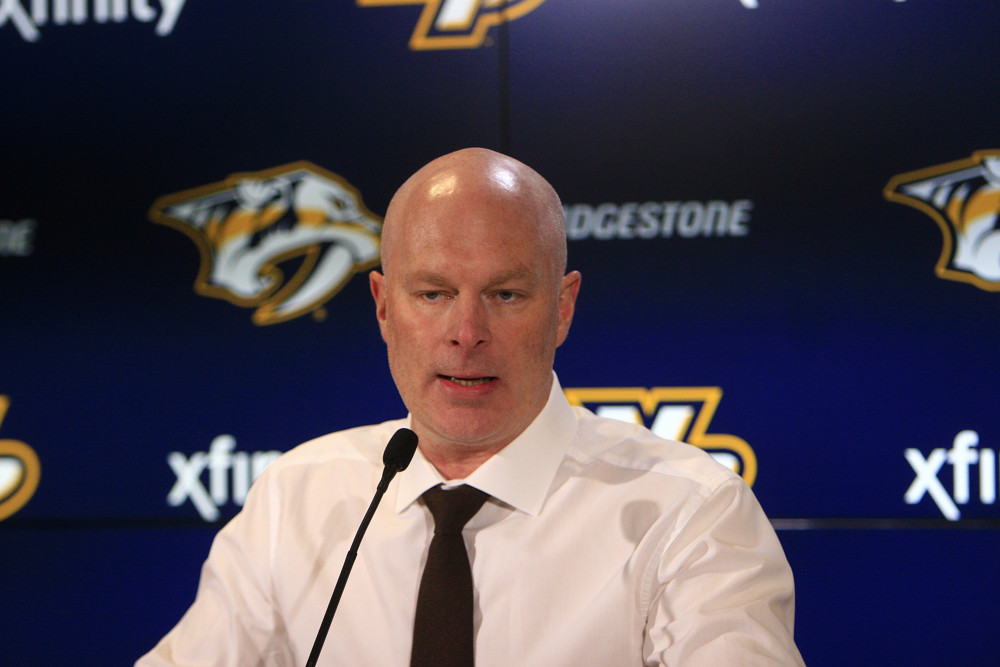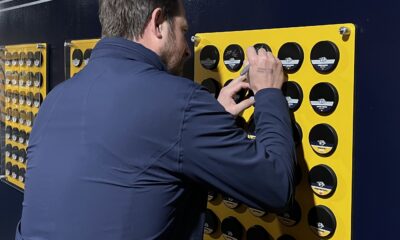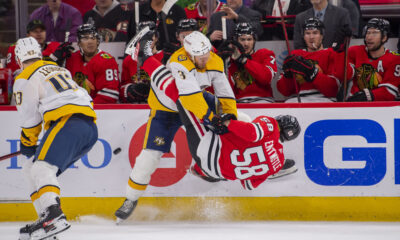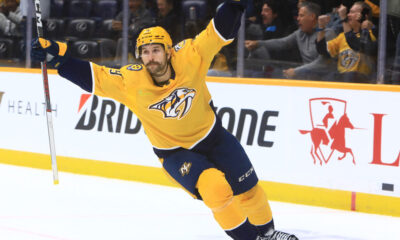The John Hynes era of the Nashville Predators is officially over, after an announcement by new general manager Barry Trotz yesterday, who also announced the firing of assistant coach Dan Lambert. While we wait for the official follow-up announcement of Andrew Brunette’s hiring later today, let’s think on how best to remember the four years of John Hynes in Nashville.
It’s a strange tenure to add up, considering the circumstances in which Hynes arrived, the world events that took place during his time here, and, yes, the decisions he made while here that left many scratching their heads.
If we are being fair to Hynes, and intellectually honest with ourselves, there may be no time period in NHL history more difficult to assess NHL coaches than the few years between January 2020 and May 2023. Specifically, the first 18 months of that span, when the world dealt with a global pandemic that shut down everything, and then the slow return back to normalcy that, honestly, only just now feels normal.
John Hynes dealt with unprecedented hurdles
While it’s true that every NHL coach had to deal with the same pandemic at the same time, only one was doing it on his 63rd day on the job. Every other coach in the NHL had a solid foundation with his team, a recognizable voice in the locker room, and a system in place to maintain stability. John Hynes was still learning how to get around the building and learning everyone’s names.
Hynes did not have an official training camp with his team until September 2021, some 20 months after David Poile gave him the job. He had to hire two assistant coaches, Todd Richards (hired in October 2020) and Dan Hinote (hired in September 2020), while completely separated from his team in the middle of the pandemic.
Like other coaches, Hynes had to prepare his team for a modified 56 game schedule in 2020-21, playing an intimidating schedule where they had to play the eventual Stanley Cup champion Tampa Bay Lightning eight times (they lost six times) and a talented Carolina Hurricanes team eight times (they also lost six times).
Countless injuries to Matt Duchene, Filip Forsberg, Roman Josi, Juuse Saros, and Ryan Johansen (the five highest paid players on the team) littered more obstacles in John Hynes’ path to guiding a successful NHL team. An expansion team in Seattle emerged in 2021, forcing Hynes (more Poile, but Hynes suffered the consequences too) to deal with difficult choices on who to keep. Losing a player like Calle Jarnkrok was not the death blow for John Hynes, but who knows the true ramifications of other actions in that move? Exposing the two highest paid forwards on the team in Duchene and Johansen sent a message that Hynes would have to deal with, forcing him to manage the fallout of two contracts he had nothing to do with.
Speaking of which, Hynes had to keep the train rolling during a massive sell-off in February 2023. Mikael Granlund, who saw some of his biggest success in Nashville while playing under John Hynes, was moved because of a bad contract by David Poile. And Mattias Ekholm was moved because Poile put too many resources into shoring up the team’s defense while neglecting the offense.
Even despite this, the team’s performance managed to get within a few points of the playoffs. A skeleton crew of prospects and AHL mainstays nearly pulled off an improbable run to the final playoff spot, succumbing to their lack of scoring and depth in the final week.
The hurdles along the way for John Hynes, who did his very best to put a solid defensive team on the ice every night, were enough to give any coach headaches.
So why did Hynes make it so much harder on himself with some of the decisions he made?
Hynes’ mistakes made things worse
Without question, the biggest error in the John Hynes era is whatever happened with Eeli Tolvanen. Future generations of hockey fans in Nashville, when they think of John Hynes, will think of him as the coach that let Tolvanen go to Seattle for free. Regardless of how Tolvanen’s NHL career pans out, it is already a catastrophic mistake.
While we do not know which came first, David Poile wanting to waive Tolvanen or John Hynes not wanting him on the team anymore, the blame should mostly go to Hynes for reducing Tolvanen’s ice time despite his improved underlying metrics.
Add the Predators’ immense struggles in 2022-23 to score goals (they finished 28th in scoring) to the onslaught of Eeli Tolvanen goal scoring highlights scattered across Twitter since December 2022 and you see the reason for the constant reminder that John Hynes is responsible.
But that wasn’t the only mistake Hynes made.
For example, his efforts to strengthen and organize the team’s defense just did not work. When Hynes arrived, he emphasized structure and discipline on the back end, forcing the forwards to create the offense while the defense worried about preventing goals. It was a simplistic approach, but a dramatic change from the “everyone attack the zone at all times” approach from Peter Laviolette.
Here’s how John Hynes’ teams performed defensively over four years:
- 2019-20: 3.10 goals allowed per game (20th)
- 2020-21: 2.75 goals allowed per game (11th)
- 2021-22: 3.05 goals allowed per game (17th)
- 2022-23: 2.88 goals allowed per game (12th)
The team was never a top ten defensive team, despite having a Norris Trophy winning defenseman and a Vezina Trophy finalist goaltender. Over John Hynes’ tenure, the team had the 14th best defense in the league. An average defensive team, with two below average seasons, despite having two of the best defensive players in the game in Roman Josi and Juuse Saros.
Hynes also insisted on size and physicality in his lineup that frequently led to matchup problems. We all remember when the Colorado Avalanche bowled over the Predators in the 2022 playoffs with no problems, but that kind of thing happened frequently in the Hynes era. Many nights, the Predators looked slower and less agile than their opponents, looking to out-muscle players they couldn’t catch up to. It’s not impossible to stop speed with size, but you have to set your system up correctly, which is something John Hynes was never able to do.
That physicality also led to penalty issues. The Predators were the most penalized team in the league in 2021-22 and the 3rd most penalized team in the league over the last four years.
Roster decisions were baffling at times. Tommy Novak, who burst onto the scene last year with 43 points in 51 games, showed signs of offensive flash the previous year. But after a brief bout with Covid-19, he was sent to Milwaukee the rest of the year for unknown reasons. Cody Glass finally made the team out of camp in October 2022, but then was healthy scratched for eight games, only to then be relied upon as a top six forward for the rest of the year. Did not playing him for those eight games really make the difference? Hard to see why.
Then there’s a whole slew of players that the Predators insisted should be in the lineup when the eye test told you otherwise. Cole Smith, Ben Harpur, Michael McCarron, Matt Benning, Matt Luff, and Cal Foote all stood in the way of younger, faster, more skilled players like Luke Evangelista, Tommy Novak, Philip Tomasino, and Spencer Sastney. And then when we finally got to see those younger, faster, more skilled players late in 2023, David Poile admitted that it was only the injuries that necessitated those call-ups. Without season ending injuries, those late call-ups (and therefore, the late 20-game push to the playoffs) never happen.
I think we can give credit to John Hynes for managing the goaltending situation effectively. The transition from Pekka Rinne to Juuse Saros was handled perfectly and Hynes didn’t use Juuse Saros any more than he had to (quick reminder that a high ankle sprain, which Juuse Saros suffered in 2022, is not an injury associated with over-use, according to medical professionals).
But the team’s overall competitiveness given the perceived talent on the roster just wasn’t good enough. The team was never considered a threat to win anything during John Hynes’ tenure, though they did make progress towards being “tough to play against”, a mantra that I imagine looks foolish given the results.
Are you really “tough to play against” if you’re losing?
John Hynes should be given just enough credit for dealing with some unprecedented obstacles in the way of his job. He should also be given just enough blame for many mistakes made along the way that prevented him and his team from overcoming those obstacles. In the end, those mistakes cost him his job, and you can’t blame Barry Trotz for accurately sizing up what was a disappointing coaching tenure in Nashville.
— Featured image via Danny Murphy/Icon Sportswire —












